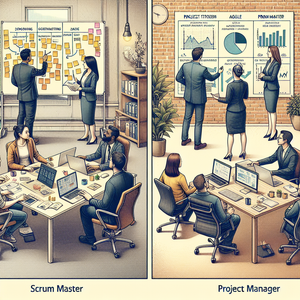
Navigating the Agile Landscape: Distinguishing Between Scrum Masters and Project Managers
In the realm of project management, especially within Agile frameworks, understanding the differences between a Scrum Master and a Project Manager is crucial. Both roles are vital to the success of projects but approach their responsibilities from different angles. Scrum Masters facilitate Agile processes, promote team collaboration, and uphold Scrum principles, while Project Managers oversee the logistical aspects of project execution, including timelines, budgets, and alignment with strategic business goals. This article explores various career paths in Agile project management, offering insights to help future candidates navigate their professional journeys effectively.
Job Summaries:
Scrum Master:
- A Scrum Master plays a foundational role in Agile project management.
- Acts as a facilitator for Scrum teams.
- Guides team members in adhering to Scrum practices.
- Organizes key ceremonies like sprint planning and retrospectives.
- Works to remove obstacles that hinder progress.
- Excellent communication and interpersonal skills are essential for a Scrum Master.
- Coaches teams toward self-organization and optimal performance.
- Achieving certification, such as Certified ScrumMaster (CSM), is often a stepping stone for those aspiring to excel in this role.
- Numerous job openings await for those interested in initiating their Agile careers.
Project Manager:
- Project Managers carry the responsibility of steering projects from inception to completion.
- They are tasked with creating project plans, managing budgets, allocating resources, and ensuring that timelines are met.
- A strong grasp of project management methodologies, such as PMP or PRINCE2, is typically required.
- Effective leadership and communication skills are vital for coordinating diverse teams and stakeholders.
- Project Managers ensure project goals align with broader business strategies, making their role critical for successful project delivery.
- Aspiring professionals can find a wealth of job listings for Project Manager positions.
Agile Delivery Lead:
- An Agile Delivery Lead is instrumental in implementing Agile practices across multiple teams.
- This role demands a deep understanding of Agile methodologies and strong leadership skills to cultivate a culture of continuous improvement.
- Agile Delivery Leads often hold certifications like SAFe Agilist or Agile Certified Coach.
- They play a pivotal role during Agile transformations, supporting teams in delivering incremental value.
- Job seekers looking to contribute to Agile initiatives can explore current opportunities for Agile Delivery Leads.
Agile Coach:
- Agile Coaches are crucial in guiding organizations through the adoption of Agile practices.
- Their responsibilities include training teams, leading workshops, and mentoring Scrum Masters to enhance their effectiveness.
- A thorough understanding of Agile principles, experience with various Agile frameworks, and excellent communication skills are vital for success in this role.
- Agile Coaches foster collaboration and encourage continuous improvement, making them invaluable assets during Agile transformations.
- Certifications such as Certified Agile Coach (ICP-ACC) are common among professionals in this field.
- Interested individuals can pursue Agile Coach positions to empower teams.
Product Owner:
- The Product Owner is responsible for defining the vision and direction of a product.
- Acts as a bridge between stakeholders and the development team.
- Prioritizes the product backlog to ensure the team focuses on delivering the most valuable features first.
- Requires strong analytical skills and awareness of market trends.
- Effective communication with both technical and non-technical stakeholders is essential.
- Often has backgrounds in business analysis or product management.
- Plays a critical role in ensuring final products meet customer needs and business goals.
- Numerous openings for Product Owner roles are available for those interested in product strategy.
Agile Project Manager:
- Agile Project Managers merge traditional project management skills with Agile methodologies to deliver projects efficiently.
- They plan, execute, and close projects while adhering to Agile principles.
- Proficiency in both project management and Agile frameworks is essential, alongside strong leadership and communication abilities.
- Agile Project Managers often hold certifications such as PMP and CSM, allowing them to bridge the gap between Agile teams and organizational strategy.
- Job seekers can explore Agile Project Manager listings to elevate their careers.
Technical Project Manager:
- Focusing on technology-driven projects, Technical Project Managers coordinate between technical teams and stakeholders to ensure timely and scope-compliant project delivery.
- A background in software development or engineering combined with project management skills is essential.
- Strong problem-solving abilities and technical knowledge are vital for guiding their teams effectively.
- Their contributions are crucial in aligning technical projects with business objectives.
- Candidates can find opportunities for Technical Project Managers to leverage their expertise in project management.
Scrum Product Owner:
- Within the Scrum framework, a Scrum Product Owner manages the product backlog to ensure that the development team delivers value through iterative sprints.
- This role demands a solid understanding of Agile principles and effective communication skills to collaborate with the Scrum Master and the development team.
- Often coming from product management or business analysis backgrounds, Scrum Product Owners are essential in maximizing the Scrum team's value delivery.
- Job seekers can explore positions for Scrum Product Owners to engage in Agile product management.
Delivery Manager:
- Delivery Managers ensure that projects are delivered on time and meet quality standards.
- They work closely with Scrum teams, facilitating communication and collaboration among stakeholders.
- Strong leadership, organizational skills, and a deep understanding of Agile methodologies are essential for this role.
- Delivery Managers remove obstacles and promote a culture of continuous improvement within teams.
- They often hold project management certifications like CSM or PMP.
- Their role is pivotal in maintaining project momentum and ensuring successful delivery.
- Interested candidates can look for Delivery Manager opportunities to lead successful project teams.
Program Manager:
- Program Managers oversee multiple related projects, ensuring they align with the organization’s overall strategy.
- They coordinate resources, manage budgets, and facilitate communication between project teams.
- Strong strategic planning skills and the ability to manage complex interdependencies are crucial for this role.
- Program Managers typically possess extensive experience in project management and relevant certifications.
- They play a critical role in ensuring that all projects contribute to the organization’s strategic goals.
- Job seekers can explore openings for Program Managers to shape project delivery.
Agile Transformation Lead:
- Agile Transformation Leads guide organizations through Agile transformations by assessing current processes, developing strategies, and implementing effective Agile practices.
- This role requires a profound understanding of Agile methodologies, change management skills, and strong leadership abilities.
- Agile Transformation Leads often hold certifications in Agile coaching or transformation, making their contributions pivotal in fostering a culture that embraces Agile principles.
- Candidates can look for Agile Transformation Lead positions to drive change in their organizations.
Change Manager:
- Change Managers handle the human side of change during Agile transformations.
- Formulating strategies to engage and support team members throughout the process.
- Strong communication skills are vital for this role.
- Knowledge of change management principles is essential.
- Collaborative abilities are important for Change Managers.
- Typically come from backgrounds in human resources or organizational development.
- Play a crucial role in minimizing resistance to change.
- Cultivate a positive culture within organizations.
- Job seekers can explore positions for Change Managers to support organizations on their Agile journeys.
Business Analyst:
- Business Analysts serve as the link between business needs and technical solutions by gathering requirements, analyzing data, and providing insights for project decisions.
- Strong analytical skills, effective communication abilities, and experience with business processes and Agile methodologies are essential for this role.
- Often collaborating closely with Scrum teams, Business Analysts ensure that user stories align with stakeholder expectations.
- Their contributions are vital in delivering projects that meet business objectives.
- Candidates can find current job openings for Business Analysts to impact project delivery.
Risk Manager:
- Risk Managers focus on identifying, assessing, and mitigating risks within projects.
- They develop risk management plans and collaborate with project teams to proactively address potential issues.
- Strong analytical skills, attention to detail, and experience in risk management methodologies are essential for this role.
- By minimizing uncertainties that could impact project delivery, Risk Managers play a critical role in project success.
- Interested candidates can explore job listings for Risk Managers to enhance their expertise in managing project risks.
Project Coordinator:
- Project Coordinators support Project Managers by handling administrative tasks, scheduling meetings, and tracking project progress.
- Strong organizational skills and attention to detail are crucial for this role.
- Typically possessing a foundational understanding of project management principles, Project Coordinators assist with documentation and communication with stakeholders, ensuring projects run smoothly.
- Job seekers can look for Project Coordinator openings to start their careers in project management.
User Experience (UX) Researcher:
- UX Researchers concentrate on understanding user needs and behaviors to inform product development.
- Through interviews, surveys, and usability testing, they gather insights that guide design decisions.
- Strong analytical skills, empathy, and experience in research methodologies are essential for this role.
- Collaborating with Product Owners and Scrum teams, UX Researchers ensure that products align with user expectations.
- Their contributions are vital in delivering user-centered products that enhance customer satisfaction.
- Candidates can check job listings for UX Researchers to positively influence product design.
Release Train Engineer (RTE):
- Release Train Engineers facilitate Agile Release Trains (ARTs) within organizations by coordinating multiple Scrum teams.
- Ensure alignment and communication throughout the development process.
- Strong leadership skills are essential for this role.
- A deep understanding of Agile principles is necessary.
- Program management experience is important for RTEs.
- RTEs are crucial in delivering value through effective collaboration and continuous improvement.
- Job seekers can explore openings for Release Train Engineers to lead Agile delivery initiatives.
Data Analyst:
- Data Analysts collect and analyze data to provide insights that inform project decisions.
- Utilizing statistical tools to interpret trends and patterns, they help teams make data-driven choices.
- Strong analytical skills, proficiency in data analysis software, and experience in data visualization are crucial for this role.
- Often collaborating closely with Project Managers and Business Analysts, Data Analysts ensure projects align with organizational goals.
- Candidates can look for Data Analyst positions to leverage their analytical skills in project management.
Scrum Trainer:
- Scrum Trainers educate teams and organizations on Scrum principles and practices.
- They conduct training sessions, workshops, and coaching to enhance Agile capabilities.
- A deep understanding of Scrum, excellent presentation skills, and relevant certifications like Certified Scrum Trainer (CST) are essential for this role.
- Scrum Trainers build Agile knowledge and promote a culture of continuous improvement.
- Interested candidates can explore job listings for Scrum Trainers to share their expertise and passion for Agile methodologies.
Portfolio Manager:
- Portfolio Managers oversee a collection of projects and programs to ensure alignment with the organization's strategic objectives.
- They evaluate project performance, manage resources, and make decisions about project prioritization.
- Strong strategic planning skills, project management experience, and the ability to analyze project data are essential for this role.
- Portfolio Managers maximize the value delivered by the organization's initiatives.
- Job seekers can check current openings for Portfolio Managers to guide strategic project delivery.
These role summaries provide a comprehensive overview of various careers related to Scrum and project management, showcasing the diverse opportunities available for individuals pursuing careers in Agile environments. Each position contributes uniquely to successful project delivery and enhances team and organizational effectiveness, catering to a broad spectrum of interests and skill sets in the project management field. By recognizing the distinctions and synergies between roles like Scrum Masters and Project Managers, aspiring professionals can make informed decisions about their career paths.
Explore More Jobs

